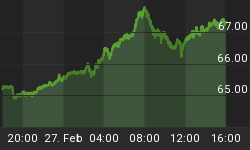Wall Street is extolling the virtues of our rising U.S. trade deficit as a sure sign the economy is well on the road to a full and viable recovery. It was reported last week that our level of trade imbalance jumped to a six-month high in December to $48.8 billion (up 3.7%), from $47.1 billion in the prior month. For all of 2011, the shortfall grew 12% to $558 billion, the most since 2008.
For the uniformed on Wall Street and in Washington, the growing tide of red ink is a signal that America is returning to normalcy. The only problem with that is our so called "normalcy" is leading us rapidly into insolvency. The sad truth is that our desire to consume foreign made goods with money that is borrowed is evidence that our country is growing weaker by the day.
A U.S. economy that is indeed strengthening would mean that we are producing more goods and services available for foreign purchase. That would serve to LOWER the trade gap, not increase it. What is occurring instead is an increase in consumer credit, which has enabled the American consumer to purchase yet more foreign made goods. To prove that we are returning to our borrowing and consuming ways, the Consumer Credit report showed that credit rose at an annual rate of 7.6% in the fourth quarter and was up 9.3% for the month of December. Our rising trade gap only proves that U.S. banks and consumers haven't learned much from the credit crisis and Great Recession. Taking on debt to consumer foreign made goods can never be a signal of economic health.
The consistent and growing flow of dollars out of the country leads to a weakening currency and the transfer of an ever increasing amount of U.S. debt into foreign control. But, it just so happens that the U.S. is happy to offer foreign investors an unlimited supply of debt for them to purchase--lucky for them. If the Congressional Budget Office has is correct, this year's budget deficit will be $1.1 trillion...and it would mark the fourth year in a row with deficits north of $1 trillion!
Foreign central banks now hold more than 50% of all U.S. debt. But their willingness to continue recycling our trade deficit and to hold dollar-denominated assets should soon start to wane. Our own bond bubble will pop just like it has already burst in Southern Europe. Only when the U.S. debt market collapses, trillions of dollars will be thrown on to the foreign exchange market, as foreigners repatriate dollars back into their domestic currencies. The destruction of our dollar and our debt will be very pernicious for the U.S. and we should be doing everything in our power to ensure the continuation of the dollar as the world's store of wealth. Unfortunately for us, our government and central bank are working very hard to expedite its destruction.















